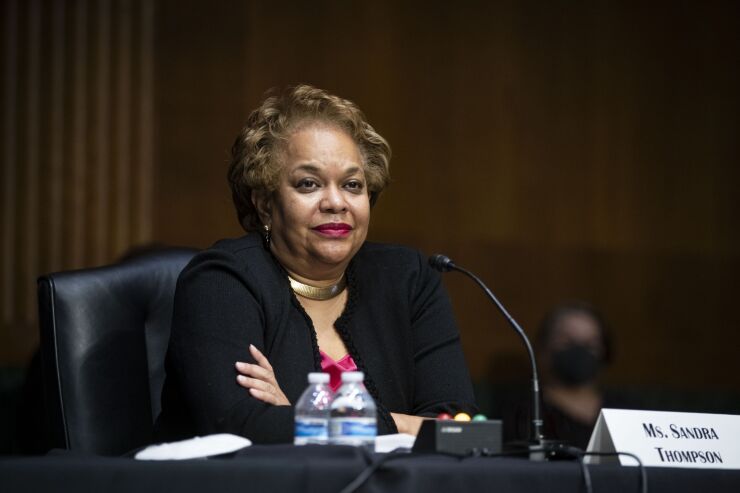
The Biden administration’s nominee to head the Federal Housing Finance Agency departs from her predecessor in several ways, but in some of her Senate hearing comments Thursday, Sandra Thompson partly echoed those of the former, Trump-appointed director Mark Calabria.
When asked during her confirmation hearing whether she’d release two government-sponsored enterprises the agency oversees from conservatorship, Thompson said it was a matter for legislators to decide.
“We would defer to Congress on the exit from conservatorship for the GSEs,” the FHFA’s current acting director said in comments that — at least in one respect — were similar those
“We will be working to help in any way that we can facilitate any questions that you have, but we think that this is something that Congress needs to work on,” said Thompson, who would become the first African American woman to head the agency if confirmed.
To date, several efforts by legislators and the previous administration to reform the two GSEs, which went into conservatorship during the Great Recession, have failed; and Thompson acknowledged their status as government wards has gone on longer than expected.
“Certainly no one ever expected the enterprises, or any financial institution, to be in conservatorship for 13 years,” she said.
Thompson said she would be willing as FHFA director to help position the GSEs for an exit, but added that Congress would need to take action on any changes to their structures, which were initially established through legislation.
“If the enterprises exit conservatorship, will the companies be private, will they be public? What form will they be in? There are just a host of issues that would have to be considered, that Congress must weigh in on; but certainly FHFA can get the enterprises ready,” Thompson said.
Thompson also fielded questions about the adequacy of Fannie Mae and Freddie Mac’s capital, and whether
She defended these moves and other recent FHFA policy actions to her chief critic during the hearing, Sen. Pat Toomey of Pennsylvania, the top Republican on the Senate Banking Committee. He questioned
“I’m concerned that the administration is seeking to use the FHFA and the GSEs to take on more risk for the taxpayers and expand affirmative action into housing,” Toomey said.
Thompson said mitigating risk and adequate capital would be top of mind if she was confirmed.
“The safety of soundness of the housing GSEs, Fannie Mae and Fred Mac specifically — they've just been allowed to build capital, and retain earnings — we think that that is very important,” said Thompson.
A move intended to encourage broader use of
Thompson also reaffirmed the FHFA’s commitment to its equitable housing plan when, in contrast to Toomey, other senators like Senate Banking Committee Chair Sherrod Brown, D-Ohio, questioned whether it went far enough in remedying the inequities between the high homeownership rates for white members of their constituencies and relatively lower ones for Black and Hispanic residents in the states they represent, particularly given that other agencies like the Federal Housing Administration have been able to do more to that end.
“What should the GSEs do to make sure they’re serving borrowers of color?” Brown asked Thompson.
“We think that these housing equitable plans will go a long way to help minority homeownerships in underserved communities across the country have access to mortgage credit,” Thompson said.




